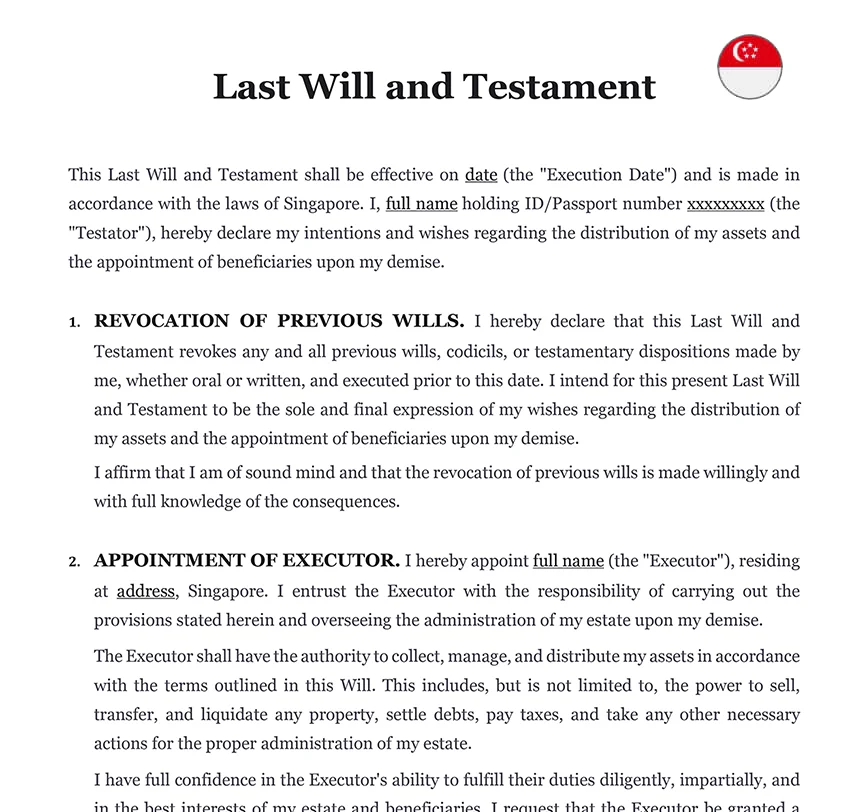Ready to use legal template
Drafted by experienced lawyers
Compliant with Singapore law
Ready to use legal template
Drafted by lawyers
Compliant with Singapore law
Home › Family law › Testament
Learn more about Testament in Singapore
A Testament, also known as a Last Will and Testament, is a legal document that outlines how a person’s assets and property should be distributed after their death. It allows individuals to appoint executors, name beneficiaries, and provide instructions for guardianship of minor children, ensuring their final wishes are respected and carried out. In Singapore, having a valid will is essential to avoid complications or disputes among family members, as estates without a will are distributed according to the Intestate Succession Act, which may not reflect your intentions. A properly drafted testament gives peace of mind and simplifies the probate process for loved ones. To help you plan ahead with confidence, download our Testament, easy to edit in Word format, expertly drafted for use in Singapore, and designed to meet your personal and legal needs with clarity and ease.
Table of contents
What is a Testament Agreement and why is it important?
A Testament Agreement, also known as a Last Will and Testament, is a legal document that outlines an individual’s wishes regarding the distribution of their assets and property after their death. It is a crucial document as it ensures that the person’s wishes are followed and that their assets are distributed as per their instructions. Without a valid Testament Agreement, the distribution of assets may be subject to the laws of intestacy, which may not align with the individual’s intentions.
ℹ️ Having a Testament Agreement in place provides peace of mind and clarity to loved ones during a challenging time and helps avoid potential disputes over the estate.
Is a Testament Agreement legally valid in Singapore?
A Testament Agreement is legally valid in Singapore, provided it meets the requirements set forth in the Wills Act (Cap 352) of Singapore. To be valid, the Testament Agreement must be in writing, signed by the testator (the person making the will) or by someone in their presence and by their direction, and it must be witnessed by at least two witnesses who are present at the same time.
It is essential to ensure that the Testament Agreement complies with all legal requirements to be considered legally valid in Singapore. Using a reliable legal template, like the one offered by Themis Partner, drafted by lawyers in accordance with Singapore law, can help ensure the validity and enforceability of the Testament Agreement.
What does a Testament Agreement include?
A Testament Agreement, also known as a Last Will and Testament, is a legal document that outlines the wishes of a person regarding the distribution of their assets and the management of their estate after their death. It typically includes the following elements:
| ➤ Appointment of Executor: The testator can appoint an executor who will be responsible for carrying out the terms of the will and administering the estate. |
| ➤ Beneficiaries: The will specifies the individuals or organizations (beneficiaries) who will inherit the testator's assets. |
| ➤ Distribution of Assets: he will details how the testator's assets, such as property, money, investments, and personal belongings, will be distributed among the beneficiaries. |
| ➤ Guardianship: If the testator has minor children, the will can specify the guardians who will take care of them in the event of the testator's death. |
| ➤ Funeral and Burial Wishes: The will may include the testator's preferences for funeral arrangements and burial. |
| ➤ Residue Clause: This clause addresses any assets not specifically mentioned in the will and ensures they are also distributed among the beneficiaries. |
| ➤ Revocation Clause: The will may include a provision to revoke any prior wills or codicils. |
| ➤ Witnesses: The will requires the signatures of at least two witnesses who were present when the testator signed the document. |




